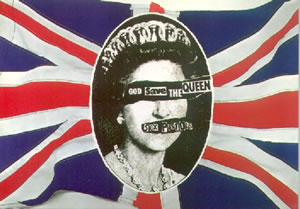
Jamie Reid's art work for "God Save The Queen"
The Absurdity of "Marxist Interpretations of Culture": Out To Lunch addresses the academy (and disses György Lukács)
[This talk was delivered to the "Marxist Interpretations of Culture" seminar in the Local History Room, Institute of Historical Research, Senate House, Malet Street, London WC1 on Friday, 4 October 2002, at 5.30pm.]
In the light of Carole Ferrier's talk last week on realist novels and the Australian Communist Party, I thought I'd to preface this paper with some remarks about changes in left academia over the last few decades. (1) This seminar was originally set up by socialist historians, and the turn towards 'interpretations of culture' marks a shift between two generations. Although an institutional reason could be cited - the decline of labour studies as a university subject - what's interesting is that there are socialists who still want to carry the banner of Marxism into academia (and combine that with support for events like the massive anti-war demo last Saturday) - it's just that now they're coming from different departments. In The Philistine Controversy, a collection of essays about aesthetics edited by Dave Beech and John Roberts and published by Verso, Gail Day registered noted 'something of a watershed around punk' (pp. 234-5, n. 11). (2)

Jamie Reid's art work for
"God Save The Queen"
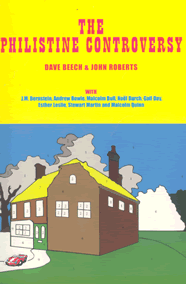
The Philistine Controversy
That puts a name to the change, and may be a useful chronological tag for the two generations: the difference in analytical focus and personal aspiration in people who got involved with left politics during the 60s, during a happy crescendo in global class struggle, and those who got involved during the 70s or 80s, during a bitter diminuendo. Any seminar which invokes the name of Marx should recognise that, unlike the flappers and the hippies, punks sourced their attitude from self-consciously marxist theorists - the situationists. Perhaps a more apt watershed in the context of an academic seminar would be noting whether or not we read Guy Debord seriously or not.
Although it's tempting, I reject the term 'postmodern' as a description of this change. Zeitgeist jargon is incapable of articulating class-struggle dynamics and conscious political commitment. It labels generations like geological layers, turning what should be political theory and debate into specious natural-history. The term is now - perhaps always was - a sticker proclaiming undialectical thought. What I hope to do in this paper is to present a criticism of this 'turn towards culture' which avoids Terry Eagleton's prescriptive 'we needed more culture, but now it's got excessive, shouldn't we start talking about ethics and trade unions and the labour party now?'. I'm suspicious of this 'we' Eagleton uses, and suspect it represents the old liberal illusion that ideas are not determined by social being and its antagonisms, but by the right-thinking of decent - and of course privileged - minds. I want to present an immanent criticism of 'cultural Marxism' by an active socialist for whom Theodor Adorno has been more crucial than E.P. Thompson. I nevertheless hope I can still communicate with socialists who think of themselves as labour-historians rather than art-critics. We shouldn't allow departmental divisions - what different crumbs of subsistence we can eke from different corners of the academic table - to fragment marxist theory, which needs to be both unified and hotly debated to be true.
It's currently fashionable for some powerful arbiters of cultural theory to recall Lenin in 1914, reeling from the outbreak of world war and the betrayals of the Second International, plunging into an intense rereading of Hegel's Logic - only to discover that a generation of Marxists had not understood Capital because they had failed to understand Hegel's dialectic and his critique of Kantian assumptions about subject and object. This rediscovery of the revolutionary kernel of Marx was an explosion in the personal life of Lenin and in the history of socialism. However, for anyone from the revolutionary left, Fredric Jameson and Slavoj Zizek's discovery of Lenin's notebooks is hardly news. When C.L.R. James and Raya Dunayevskaya formed the Johnson-Forest Tendency in the American Socialist Workers Party in 1947, they based their critique of orthodox Trotskyism on a reading of Hegel inspired by Lenin.

Raya Dunayevskaya
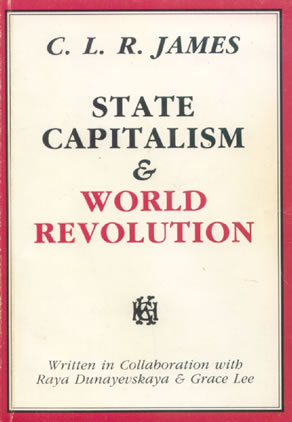
C.L.R. James's book
In Britain, Gerry Healy of the Workers Revolutionary Party used Lenin's private, off-the-cuff notes - totally unacademic responses to some of the most difficult philosophy in the western tradition - to inspire working-class activists to investigate dialectics for themselves. Improvising singer Maggie Nicols described this in a recent interview:

Maggie Nicols with No Rules
OK
Mad Pride at the Bull & Gate 19 November 2002
Then I joined the Workers Revolutionary party. I'd left school at 15 and being a member of the party was a wonderful education. They had an education centre and I learnt about Hegel, Marx and Engels. For the first time I realised that everyone goes from ignorance to knowledge and it's a continuous process. There aren't certain brain cells that make you either clever or thick - you can actually learn about ideas and concepts. We had lessons in economics, which never really sunk in, but I took to philosophy like a duck to water. I found concepts like dialectical materialism really exciting and it opened my eyes. And there's some brilliant stuff in Lenin's writings about Hegel that really gave me hope. Hegel is very difficult, and Lenin's notebooks are full of scribbles questioning what Hegel is on about. There's the sense that Lenin himself grappled, and then you realise it's not about reading something passively and immediately understanding. You have to struggle and practise to reach an understanding - there's a process involved. Maggie Nicols interviewed by Philip Clark, 'From a Deep Place', Jazz Review, October 2002, pp. 28-9.
There is a reason why the latest insights Jameson and Zizek can come up with aren't news to revolutionary socialists. As a theory of working-class emancipation, marxism reveals how capitalism separates producer from product; the agony of art in a commercial system is therefore simply a specific example of the general alienation of labour. If we apologise for the poor style of a proletarian writer like Jean Devanney by saying that she lacked the free time and educational resources of a Patrick White, we're in danger of conceiving value as a trickle-down resource, and abandoning Marx's revolutionary version of the labour theory of value. This is why modernism - denied to the labour movement by stalinism after the denunciation of James Joyce at the 1934 Soviet Writers Congress - is essential for a socialist interpretation of culture. The successive contributions of Joyce, Beckett, Burroughs and Iain Sinclair mean that one can now read the avant-pulp skinhead novels of Stewart Home and find in them both a proletarian consciousness and a literary knowingness absolutely lacking in, say, Martin Amis. Punk modernism reveals middle-class privilege and culture as a blinkered sham - an insight to be found in Trotsky's essay on the way Louis-Ferdinand Céline had invigorated literary French with an influx of colloquial vigour, but lacking in stalinist pronouncements on culture, who cauterised their realism by demanding that it be exemplary and uplifting.
Unfortunately, it's not always possible to leap straight from Trotsky to persuasive marxist interpretations of culture. The division of labour in the academy between politics and literature is reflected even among so-called revolutionaries. Party hacks seem able to twist Trotsky's criticism of Proletkult into what looks suspiciously like a bourgeois-stalinist 'defence of culture'. This is where the marxist interpretation of culture needs to become absurd. If cultural analysis is not to be a species of top-down management, where critics supervise and canonise works of art which have been sundered from the control of their producers, it needs to discard the revisions and dilutions which make 'Marxist cultural theory' a convenient ideology for middle-class professionals. It must return to the revolutionary kernel of Marx's thought: arm the producer and spit in the eye of the manager. It can only do this by becoming productive itself, which is to say it must become wobbly and unsafe, unguarded by intellectual professionalism and open to criticism from those engaged in artistic production themselves.
To do this, I want to argue, theory must bring some of the absurdity of art's current productivity into the arena of thought, revealing that without a reflexive theory with a place for the thinking subject, an opportunity to divide the listening audience into scoffers and supporters, the microscopes of close analysis are actually blinkers. The critic who can prove without-a-doubt that a particular artwork is valuable or worthy has already demoted the art-object to a mere illustration of a readymade ideology. It begs the question of why bother with culture at all. By stripping out a single level of existence, the very concept of 'culture' reduces our ability to understand the social forces working inside it. Cultural pundits resemble medieval knights, viewing the world through a single, horizontal slit in the helmet's visor: it allows them a splendid view of the horizon, but they trip over every stone in the road.
A different image of the advantages of holism is suggested by Vladimir Vernadsky's concept of the Biosphere, launched by a book of that name published in Leningrad in 1926. Vernadsky argued that geologists, biologists, marinologists and meteorologists were failing to organise their empirical data convincingly because they lacked a holistic vision of the development of the earth's atmosphere and crust. Using a term coined in 1875 by E. Suess, professor of geology at Vienna University, Vernadsky traced the planetary impact of life on the longterm formation of air and rock, elemental substances deemed by metaphysicians and existentialists and a million inferior poets to be opposite principles to those of life. He discovered that not only the atmosphere - a product of photosynthetic action on the part of plants - but the earth's crust itself is a product of living orgamisms. Successive sedimentary layers built up by the accumulation of shells and bones on the ocean floor, and by rain-forest vegetation during the carboniferous eras, have been continually raised as mountains and plunged into the magma of the earth's core. In fact, even though living organisms and bacteria only occupy a thin upper layer at any one time, the entire earth's crust can be conceived as a biological product. Earth and sky interact, and the action of life is crucial for both. The land masses - floating hunks of rock moving upon tectonic plates - affect the global circulation of the atmosphere, while the action of wind and water shapes these land masses. The continual action of the sun's rays on the earth - energy fixed by plants as cellulose and carbohydrates, and in turn consumed and metabolised by animals - is the motor for planetwide transformation.
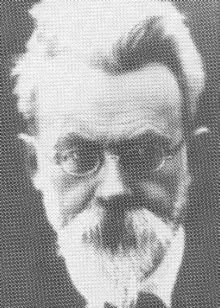
Vladimir I. Vernadsky
As Vernadsky puts it:
Life is, thus, potently and continuously disturbing the chemical inertia on the surface of our planet. It creates the colours and forms of nature, the associations of animals and plants, and the creative labour of civilized humanity, and also becomes a part of the diverse chemical processes of the Earth's crust. There is no substantial chemical equilibrium on the crust in which the influence of life is not evident, and in which chemistry does not display life's work. Vladimir I. Vernadsky, The Biosphere, 1926, §21 (translated David B. Langmuir, New York: Copernicus, 1998, pp. 57-8)
Vernadsky's ability to think different areas of knowledge at the same time is extraordinary, and has proved of great value to scientists seeking to understand such issues as global warming. His book was translated into English in 1998, with an introduction comparing his importance to that of Einstein, Mendel and Darwin. The concept of the biosphere is a magnificent vindication of the advantages of a holistic approach over departmental divisions. Vernadsky's idea of relating plant and animal life to the formation of the atmosphere and the earth's crust, of conceiving the terrestrial globe as a single entity, suggests a stunning array of possible empirical investigations, many of which are outlined in the extensive annotations in the recent edition. The biosphere provides an image for what's wrong with "cultural Marxism": like meteorologists studying cloud patterns without being aware of the landmasses which direct ocean currents, or of the longterm effects of life on carbon-dioxide and oxygen levels, or of the effects of solar and cosmic radiation, 'cultural Marxism' isolates a single strip of an interactive totality and so cannot map its dynamics. It remains vulnerable to the dismissive attitude towards culture which is bound to occur in a society where culture is associated with wealth and privilege. A genuine Marxism, on the other hand, which seeks to understand capitalism in its totality, can provide genuine insights into cultural issues. In applauding Theodor Adorno, too many people forget to mention that he was in continual dialogue with the economists and sociologists of the Frankfurt School: Negative Dialectics reads like pure speculative philosophy, but it would have been impossible without Friedrich Pollock's concept of state-capitalism.
I've plundered Vernadsky for an image of the advantages of a holistic approach. I also want to focus on him as an example of a genuine relationship between science and Marxism, a model for how Marxism might intervene in cultural issues. At Marxism 2002, China Miéville criticised the 'tribal' mentality on the left which applauds popular writers and celebrities if they're socialists - 'one of us' - but doesn't stop to examine the political implications of their work itself. Vernadsky's relationship to Marxism was far from overt. He wasn't 'one of us' in the sense of declaring himself in favour of the emancipation of the working class. His politics were liberal. Along with many scientists, he resigned his post in protest against Tsarist repression in 1911. He welcomed the fall of the Tsar and the February Revolution of 1917, and accepted a position as head of the Department of Mineralogy and Geology at Moscow University in May. However, he was no bolshevik. Blaming ill health, he fled the October Revolution to stay with his family in the Ukraine, then left for Paris. He returned to Russia in 1926 and worked under the Stalinist regime until 1945. However, even though he found it hard to maintain intellectual contact with the West (his lectures at the Sorbonne in the early-20s had been well received, and attended by Teilhard de Chardin and Edouard Le Roy), he had nothing to do with the specious 'Marxism' encouraged by Stalin. He continued to develop his ideas and engage in empirical reasearch. As with the linguistic theory of Valentin Voloshinov, his holistic and anti-metaphysical approach couldn't have arisen without the efflorescence of marxist and progressive ideas in pre-stalinist Russia, but he did not cite Marx or Engels in his writings. Still keen for international recognition, he did not wish to go the route of Lysenko and twist science into Soviet ideology. However, though he did not use Marx, the Marxists certainly used him. In Materialism and Empirio-Criticism, Lenin praised Vernadsky for showing 'with exemplary clarity how shallow and unfounded are these claims to convert the scientific views of a given historical period into an immobile, dogmatic system obligatory for all' (Peking: Foreign Language Press, 1971, p. 362)

Lenin de-Stalinised by Comrade
Colleen Ridgeway
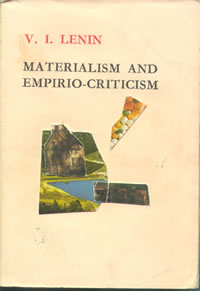
Materialism and Empirio-Criticism
decorated by CCR
Lenin's appreciation of Vernadsky's unorthodox approach was not mere rhetoric. In response to urgings by Vernadsky and the mineralogist E.A. Fersman, a nature reserve was established in the southern Urals in 1920. According to John Bellamy Foster, this was 'the first reserve anywhere by a government exclusively aimed at the scientific study of nature' (Marx's Ecology: Materialism and Nature, New York: Monthly Review Press, 2000, p. 243). This ran parallel to N.I. Vavilov, the first President of the Lenin Agricultural Academy, who coined the term 'gene diversity', seeking protection for the rich banks of germplasm in the tropical and subtropical regions of the USSR. (same, p. 242) Before his assassination in a cell by Stalin's secret police, the leading bolshevik Nikolai Bukharin was working on several manuscipts. One of these was Philosophical Arabesques, in which he enthused about Vernadsky's concept of the biosphere, and the new relationship it envisaged between human beings and nature. He wrote:
Human beings are both products of nature and part of it; if they have a biological basis when their social existence is excluded from account (it cannot be abolished!); if they are themselves the summits of nature and its products, and if they live within nature (however much they may be divided off from it by a particular social and historical condition of life and by the so-called 'artistic environment'), then what is surprising in the fact that human beings share in the rhythm of nature and its cycles? Nikolai Bukharin quoted by John Bellamy Foster, p. 227.
Armed with a Marxism as eco-friendly and un-tankie as this, we can appreciate the scream against alienation contained in Philip K. Dick's Do Androids Dream of Electric Sheep?, which envisages a future hell in which only the rich can afford contact with animals. The quote from Bukharin comes from John Bellamy Foster's Marx's Ecology. Like Martin Miller's Freud and the Bolsheviks: Psychoanalysis in Imperial Russia and the Soviet Union (New Haven: Yale University Press, 1998), Bellamy's book is a fantastic vindication of the expansive and progressive nature of the bolshevik regime under Lenin. These books - written by specialists - are doing important work in resynthesising the reality of revolutionary marxism and resurrecting the extraordinary ensemble of progressive ideas which accompanied the Russian revolution. They connect to direct politics because of the way that new movements in anti-capitalism - eco-protest, Mad Pride, the anti-war movement, name what you like - are waking up Marxism from its economist slumbers and reconnecting it to a total critique of life under capitalism.
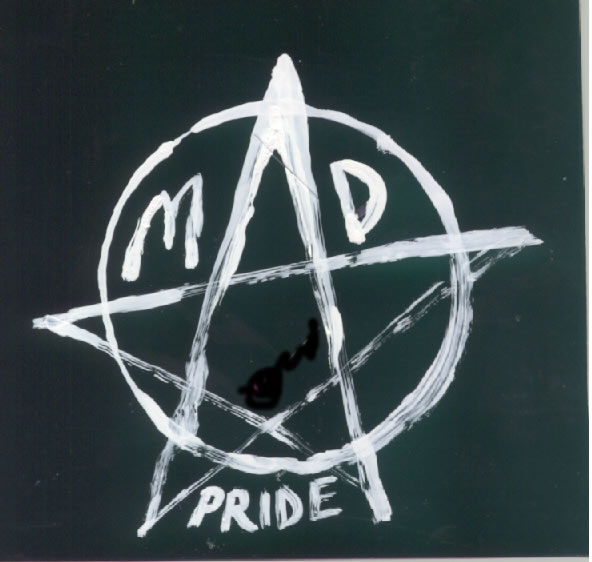
New "left-communist" Mad
Pride logo
I want to argue that research like this, because it is concrete and unideological, has more to say to artists - actual producers of cultural use-value - than the brokerage of 'cultural value' engaged in by theorists like Zizek and Jameson, whose juggle of concepts seems to wall out the world rather than expose its mechanisms.
By saying this I am not rejecting the necessity and delight of speculative philosophy, just saying that with post-war Existentialism 'theory' became a commodity, and this demands a sceptical and on occasions barbaric attitude towards it, an attitude which flouts the law of value and asserts human need against the logic of its transactions: a theoretical equivalent of anti-art or the anti-capitalist stunt - that is to say, revolutionary Marxism. The post-war commodification of theory was acknowledged by Adorno in the second thesis of Negative Dialectics in 1966 when he said 'no theory today escapes the marketplace' (p. 4) - which is why his book is radically anti-systemic and actually constitutes no 'theory' at all. Commodification turns theory into a 'lifestyle' option, effectively transforming it into precisely the 'fetish' much of it pretends to criticise. No-one can sell me a life because my life is not determined by what I choose to buy, but by my relationship to the means of production, for which being able to sell my labour power is the over-riding anxiety (or cause for celebration at particular moments). In order to wrest the tradition of philosophy from the consumerism that threatens to overwhelm it, we need to take it from the shop window and placed directly in the street - which is where Socialist Worker sellers, anti-war agitators and Reclaim The Street protestors are to be found.


Protestor atop bus
Liverpoool Street Station, J18
Marxism isolated from practice has a strong tendency towards idealism. What I mean by this is that successful purveyors of intellectual commodities begin to imagine that they're really shaping ideas. They therefore construct an imaginary history in which intellectual fashions are driven by celebrity brand-names. It leads to the kind of foreword which Fredric Jameson wrote recently for the reissue of Jean-Paul Sartre's Critique of Dialectical Reason, where he establishes a sequence between existentialism, structuralism, post-structuralism and post-modernism without any mention of the economic basis of the suppression of the revolutionary and subjective side of Marxism - ie Stalinism - and its replacement by a series of unscientific fads. Sartre's book was written as a polemic versus Pierre Naville - surrealist, 4th Internationalist and biographer of Trotsky - though you would never learn this from Jameson's foreword: that's because Jameson is engaged in the same racket as Sartre, and so is utterly defenceless against Naville's critiques. Naville is too hot for the academics to handle. Untested by political practice, philosophical ideas become for Jameson something to be observed from outside, their sequence through the decades as natural and arbitrary as the weather.
Marx summarised the opposite, materialist viewpoint - as Bellamy Foster argues, substantially to be found in Epicurus, and well expressed in Lucretius's poem De Rerum Natura - in a quatrain he wrote in 1836:
Kant and Fichte soar
to heavens blue
Seeking for some distant land
But I seek to grasp profound and true
That which in the street I find
MECW, Vol 1, p. 577.
Marx went on to say:
Only when science starts out from sense perception in the dual form of sensuous consciousness and sensuous need - ie only when science starts from nature - is it real science. 'Economic and Philosophical Manuscripts', Early Writings (Penguin), p. 355.
That quotation from the 'Economic and Philosophical Manuscripts' - a resource denied to Jean Devassey when she was arguing with Australian Communist Party apparatchiks about the supposed 'indecency' of her novels - shows how humanist and anti-dualist is Marx's idea of science. Science isn't real unless it starts out from sense perception, which he then divides into sensuous consciouness and sensuous need.

Plato exalted consciousness above bodily need and the external world, placing man's essence above and in opposition to nature, not inside it. Marx's sexual politics was radically progressive because he recognised perception as driven equally by consciousness and need: unlike Plato and St Paul, he did not set up mind and body in opposition. Devanney had access to Engels' The Origins of the Family, which contains a powerful argument for moral relativism and women's liberation. However, it does this by telling the story of humanity's development from the beginning as if it is possible for the thinker to stand outside history. This meant its literary and emotional impact is completely different from reading early Marx, because it does not directly address the indignant heart and the pulsing blood: that recognition of what it is to be human which is suppressed in authoritarian literature and science, and which is directly addressed by subversive writers like François Rabelais, de Sade and Sigmund Freud. Without this scandalous aspect - the mediation of theory via the autonomous intellect and imagination of the reader, where self-knowledge of the tools of thought waxes alongside knowledge of the external world, where the reader suddenly feels ten-miles high - then marxism becomes a dry-as-dust list of gloomy facts which can then be used to bully and cajole the comrades.
The place of nature is crucial in this, the philosophical key to a progressive politics which can unite feminism, eco-protest and workers struggles. Marx's Critique of the Gotha Programme (1875) was a polemic against the fusion of the German Social Democratic Party with the followers of Ferdinand Lassalle. In retrospect, Lassalle's fantasy that a strong, Bismarckian state could protect the working-class from capitalism was a tragic mistake, leading to the incorporation of the world's largest workers party into the logic of imperialism and the failure of the Second International to prevent the First World War. However, Marx's polemic hinged on what might seem like a minuscule philosophical disagreement: Lassalle said value was solely a product of labour, and forgot to mention the contribution of nature. He'd even forgotten that labour power was in fact a natural force. Everything Marx wrote can be unpacked from this Epicurean perception: without it, scientific investigation becomes a mere means to technical mastery of an alien and unresponding universe; without it, scientific investigation lacks the goal of self-knowledge which makes it meaningful to a class with no-one to exploit.

Marx emphasizes the subject's involvement with any objective investigation, breaking through Kant's dualism to a materialist and monist understanding of man as a product of nature. As an example of what happens when one loses this dialectic, one could cite Stefan Sullivan's Marx for a Post-Communist Era: on Poverty, Corruption, and Banality, published recently by Routledge. Sullivan wrote a PhD on Hegel and Marx at Oxford in 1994 and was supervised by John Torrance and Leszeck Kolakowski, professor of philosophy at Warsaw until he was expelled for political reasons in March 1968. The three terms of the book's subtitle (ie poverty, corruption and banality) are taken to be the malaises afflicting - in order - economics, politics and culture under capitalism. The Marx who emerges is so unrecognisable, it is enough to disfigure one's image of doctoral scholarship forever. For example, Sullivan says it is 'intrinsic to Marx's system' that 'the path to communism lies through the redistribution of surplus wealth' (p. 3), whereas Marx said in his Gotha Programme Critique that it was 'in general a mistake to make a fuss about so-called distribution and put the principal stress on it' (1875, p. 17) (Sullivan dismisses Marx's disagreements with Lassalle as no more than 'professional jealousy', p. 114). Sullivan's errors are legion, but they are made easier by the frame in which he sets his argument: economics, politics and culture are kept in water-tight compartments so that Marx's observations can be reduced to devoutly-to-be-wished ideals for each sector. Marx's holism - his appeal to the whole corpus of possible knowledge, to both the reader's instinctual sympathies and to the self-reflection of concepts, his awareness of what it is to be thinking about history and mankind in an era of capitalism - is sacrificed by Sullivan on the altar of bourgeois specialisms. In economics, Marx becomes merely the bad conscience of modernity, his critique of capitalism reduced to a wish to abolish global poverty - an aim which the much-maligned World Bank has apparently now adopted (pp. 86-7). Sullivan argues 'The UN, the World Bank, the IMF, the OECD and powerful industrialised nations can all play a significant role in restricting the private exploitation of public wealth.' (p. 131) In politics, the problem of corruption is prettymuch restricted to thirdworld countries and the 'immaturity' of its politicians - whereas the politics of, say, Nigeria is actually impossible to understand without tracking the economic activities of a multinational like BP. Still more disturbing for anyone righteously involved with promoting 'cultural Marxism' in academia, in his chapter on culture, Sullivan takes on board Perry Anderson, Judith Butler, Ernesto Laclau, Slavoj Zizek, Negri and Hardt and Julian Stallabrass as fellow critics of commercial 'banality' without feeling any ruffles to his liberal politics.
Of course, one cannot blame writers for the uses put to them by others, but the ease with which Sullivan debarbs Marx with his separation between economics, politics and culture should give any purely 'cultural Marxist' pause. Sullivan derives his concept of banality from Hannah Arendt, who has a long history of reducing Marxist ideas to liberal ones. According to Sullivan, banality
manifests itself in all forms of human interaction where the individuality of the human agent is replaced by the generic fact of his or her purchasing power (p. 136)
This sounds critical, but it remains uninformed by the class-specificity of Marx. Sullivan is criticising shopping, not work. In fact, far from obliterating individuality, purchasing power buys it: this is the meaning of the hierarchy of credit cars, motor cars, hotels and flight arrangements offered to purchasers.
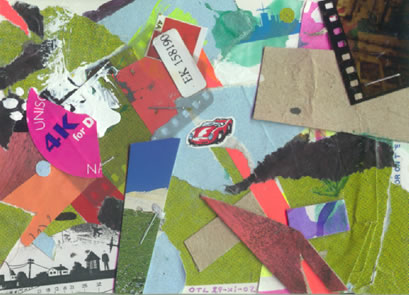
The 'generic fact of his or her purchasing power' is money, and in so far as it purchases use values, it allows the extension of individuality in the bourgeois sense - a consuming, non-creative individuality. Marx's sensualism, so incomprehensible to the middle-class moralist, is actually enthusiastic about the use values generated by capitalism; it is the fact that capitalism replaces the individuality of the human agent by endless abstract labour which he finds horrifying.
Sullivan is full of praise for the Western Marxists. Their emphasis on the early chapters of Capital on commodity fetishism have allowed them
to broaden their frame of reference away from the worker's struggle to the more general role of money in culture ... It allowed them to speak not only about the alienation of the worker, but the alienation of the capitalist and the bourgeois cultural consumer as well. (p. 142)
Sullivan treads on a sore point in Marxism here, one in which changed conditions require careful application of categories like 'worker' and 'bourgeois'. In 1926, university students in Britain blacklegged on the general strike and drove trains. In 1968, the massification of education - ie of bourgeois culture - meant that student demonstrations inspired workers to take part in the greatest general strike in history. This trend has accelerated. Today, New Labour say they want fifty percent of school-leavers to attend university. This change may explain the divergent assessments of the potential of 'culture' as a tool for socialist transformation among people attending this seminar. However, since sociologising people who are actually present - who are subjects, rather than objects - is an insult, I'm going to pursue this debate by examining the theoretical sources of Sullivan's usefully crude summary of Western Marxism.
Characteristically for a marxist seeking a non-workerist or 'theorised' criticism of capitalist culture, Sullivan quotes from György Lukács's essay from 1920 'The Old Culture and the New Culture'.
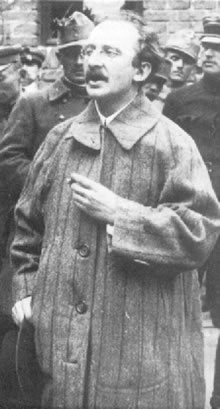
György Lukács
in 1919
Lukács was working with two concepts of culture, one which derived from romantic notions of 'spiritual truth', and one which derived from Marx's critique of surplus value. These two concepts of culture fail to integrate in the course of his argument. One can draw out sentences to support various preconceived positions, but such citations rely more on the prestige of the name Lukács than the logic of the essay, which is flawed. Lukács damns the bourgeois culture around him:
The culture of the capitalist epoch had collapsed in itself and prior to the occurrence of economic and political breakdown. György Lukács, 'The Old Culture and the New Culture', Kommunismus, I, 1920 (translated Paul Breines, Telos, no 5, Spring 1970; in György Lukács, edited E. San Juan, Jr, Marxism and Human Liberation, NY: Delta, 1973, p. 4)
This is a judgment which relies on assessment of the relative merits of Wordsworth and Tennyson, Beethoven and Wagner, Goethe and Nietzsche. Without such aphoristic pronouncements, criticism becomes mealy-mouthed and boring - the writings of Benjamin and Adorno are full of them - but to measure its truth requires a leap of the imagination, not to say extensive knowledge of cultural and literary history.
On the same page, Lukács defines culture as:
The ensemble of valuable products and abilities which are dispensable in relation to the immediate maintenance of life.
This turns culture into a kind of 'commodity-plus', or surplus value. It is in danger of making the 'immediate maintenance of life' a kind of inert, non-historical bedrock on which culture might be erected as a kind of ricketty, betasselled superstructure. Culture as a realm of freedom is deprived of any relationship to necessity (or 'the immediate maintenance of life'). In Capital, Marx began with Nicholas Barbon's observation in 1696 that from the point of view of commodity production, it did not matter whether the need the commodity supplied sprang from bodily need ('Magen') or conceptual imagination ('Phantasie'). As in his observation about perception in 'Economic and Philosophical Manuscripts', Marx refuses to split apart consciousness and need, mind and body. He recognises that the economy evolves through the generation of new needs, which then become the 'immediate life' of those who inherit them. Lukács is applying a metaphysical distinction between the necessities of life and luxuries which show ignorance of the roots of capitalism in mercantilism and the spice trade.
Lukács makes his point about the unnecessary aspect of culture more graphic by describing how 'immediate evils and miseries' 'block the ultimate questions from consciousness':
Someone is racking his brains over a complex scientific problem but during his work he contracts an unrelenting toothache. Clearly, in most cases he would be unable to remain in the stream of his thought and work until the immediate pain is relieved. (same, p. 18)
This is undeniable, rather like the economic treatises that begin, 'suppose a man has been shipwrecked on an island: his first task will be to secure sustenance and shelter ...'. However, as Marx pointed out, most people are not Robinson Crusoes. Is the situation of the proletariat as regards culture actually like a scientist with toothache trying to concentrate on a problem? Lukács on culture in 1920 is something of a Robinsonade.
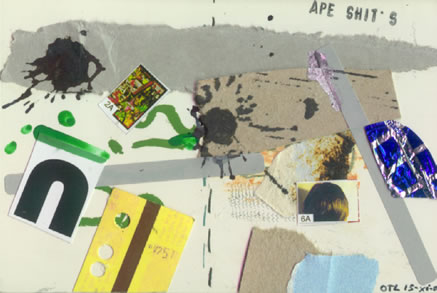
Bertolt Brecht said of Lukács that he wrote criticism like an apparatchik, that production made him 'uncomfortable' because it's 'unforseeable' (Walter Benjamin, 'Conversations with Brecht', 25 July; edited Ronald Taylor, Aesthetics and Politics, London: Verso, 1977, p. 97). Marx's assault on dualism was predicated on looking at things from the point of view of the class of producers, for whom the freedom from feudal economic relationships has become the necessity of wage-labour - natural dialecticians. When Lukács argues that the beauty of a house is different from its durability and protectiveness, he splits apart aspects which left modernist movements sought to unify when they argued that truth to materials and egalitarian power relationships are beautiful in themselves. In looking from the point of view of consumption rather than production, Lukács inevitably separates appearance and essence, since consumption under capitalism ('choice') means being forced to judge by appearances. Only the producers really know what's in the can of soup.
To say that culture is what happens once immediate necessities are met and 'free energies are at the disposal of culture' (p. 4) sounds plausible, but the view is bourgeois rather than universal. It is what happens once culture has been made a specialised function, rationalised as a visit to the concert hall or art gallery. Culture for the Polynesian might be barbeques and surfing and campfire singalongs, in which religion and eating and sport and social jostling are all combined. However, as a critique of bourgeois culture, Lukács remarks were devastating:
The moment cultural productions become commodities ... their autonomy - the possibility of culture - ceases. (p. 6)
In fact, he manages to anticipate much of both Adorno and Debord:
Civilization, and its most developed form, capitalism, has brought to a peak man's slavery to social production, to the economy. And the sociological precondition of culture is man as an end in himself. This precondition, which was present for the ruling classes in precapitalist societies and which capitalism removed from everyone, is created for all with the final phase of proletarian victory. (p. 15)
This is a call for classical aesthetes to join the proletarian revolution because capitalist commodification has ruined their personal fiefdom. It is not a bad argument, but its offer of salvation is restricted to a particular moment of cultural history. To address current conditions, we need something more scientific and solid than a call to defend the supposed autonomy of pre-capitalist culture.
The tendency of capital is to pay the least it can to its employees, creating misery and hardship. This is now true on a worldscale. It breaks up traditional communities, creating vast shanty-towns and conditions which can frequently resemble slavery. However, it is not true that this reduction to the 'immediate maintenance of life' destroys all culture. Since the collapse of classicism witnessed by Lukács - ruins stomped on gleefully by the various modernisms of the early twentieth century - a new cultural dialectic has evolved. If culture requires products and abilities which are 'dispensable' in relation to life's necessities, on other words, if culture is a luxury, what exactly is the Blues, and how come one of the most exploited and oppressed people on earth invented it? How come the very people whose sweat and blood supplied Jane Austen's heroines with their wealth invented a musical form which wreaks havoc on their fine sensibilities and proposes an utterly different relationship between sociability, sexuality and property?
When Muddy Waters was recorded in 1942 by Alan Lomax on Stovall's Plantation - where Charles Peabody had heard an old black man singing some strange music, resulting in the first article about the blues, published in the Journal of American Folklore in 1903 - Waters wasn't absolutely destitute. Like all the sharecroppers' landlords, William Howard Stovall kept Muddy Waters and family in debt, and Waters had to plough, fish for catfish, brew moonshine and play guitar to make ends meet. He remembers one Christmas when there wasn't any food on the table. In other words, he had few opportunities to engage in what György Lukács deemed 'culture'.
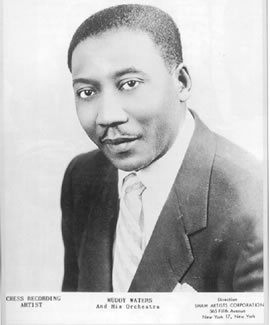
Muddy Waters in 1955
Yet the music Muddy Waters played is epoch-making. The form had been evolved by piecing together fragmentary memories of African scales and keys (slaves from different tribes were mixed up, so that they couldn't communicate in anything except the master's English). African instruments were associated with rebellion and plantation burnings and were confiscated. The new music was played on guitars and was frequently based on folk songs indigenous to the white population. The Blues uses a motivational harmonic interval that appears to move listeners beneath the level of cultural knowledge or expertise. Although you can find similar harmonies in Debussy and Wagner, blues modes are different from those in folk music, having a more driven, less circular logic. Likewise, the blues had a rhythmic emphasis - an endless chug, a musical answer to the endless labour demanded by capitalism - which was unknown in Europe. When Muddy Waters amplified his bottle-neck guitar, he created the electronic sound which underlies the universal timbre of global corporate pop. Whereas the European use of electricity resulted in instruments which imitated the supposedly angelic and unearthly associations of the trained soprano - the Theremin and the Ondes Martinot - Muddy Waters' electric-guitar sound was crudely male and sexual. His bottle-neck guitar has all the power and universalism associated with electricity as instant social energy, but it's as controlled by minute finger vibrations as the operation of a lustful hand on the female sexual parts. His proud use of regional accent - a seeming inability to pronounce consonants, a perpetual, ecstatic, drunken loss of the repressive brain centres - and his succession of oral-sex harmonica players were aspects of a cultural transformation that was so complete that we're inclined to think it's natural, and so fail to treat it with the kind of detail accorded art history. His band was known as the Drunken Waters Band, and his sexual promiscuity was enthusiastic and endless. In fact, the impact of the Muddy Waters sound is so direct that listeners quite rightly claimed it wasn't 'music' but some kind of diabolical sexual energy. Despite all the subsequent attempts at commodification and control - pop stars who look like actors, operatic theatricalisation, reducing the sound to a signifier of glamour - what Muddy Waters started keeps upsetting categorical ideas of 'culture' as an elevation from the immediacies of life, emerging as much as a necessity as the orgasm which Wilhelm Reich called 'cosmic plasmatic sensation'.
Okay, end of beatnik bluesman rhapsody section. It's difficult to include so powerful an illustration as Muddy Waters in an intellectual argument. He threatens to capsize the dignity of the analyst. However, this really goes to show how much we confuse thinking with coolness of the blood - something Marx always inveighed against. If Marxists aren't going to explain the impact of this music - its provenance as a response to capitalism, its defiance of christian morals, its use of global social energies - then we leave to door open to the Nietzscheans and Deleuzians, which would be an intellectual crime.
Lukács perceives culture as capital, a surplus beyond the immediacy of life. The sting in the tail of his analysis - and what lifts it above Pierre Bourdieu in Distinction - is that even the bourgeoisie cannot appreciate this surplus because it, too, must serve the commodity system, and so is unfree and therefore the opposite of culture. It's a good twist, but we shouldn't be so enamoured of this twist that we fail to recognise the narrowness of his cultural purview, and its inability to throw light on subsequent developments. Lukács's positivist concept of culture cannot map the idea of the music invented by those deprived of everything except the immediacy of life sweeping the world from Dakar to Archangelensk. It may require a shift out of the world of the traditional novel to appreciate the Blues - one I would argue has been actually been made by Iain Sinclair and Stewart Home, which makes their writing relevant in a way most 'novels' are not - but such a shift makes Lukács's formulae about proletarian existence seem extraordinarily abstract and rhetorical. What would a life reduced to the 'immediate maintenance of life' really be like? Could it actually be lived?
The blues principle introduces a test of authenticity into commodified culture which makes that culture highly unstable. The Derridean jargon of anti-authenticity has made the word 'authentic' unpopular, but for that very reason it needs to be revived. Marxism is a theory of provenance. It seeks to find out who made what where and who got the money for the product - how the surplus-value was divided between profit, interest and rent. By the 'authenticity' of the blues, I am not making formal or racial prescriptions, but refering to the fact that no less than radical Modern Art, popular music recognises the power of negativity. The capitalist music industry can only tap novel energies by playing with forces that threaten to expose its manoeuvres as a fraud. Of course, like capitalist asset stripping, there are periods when readymade structures - record companies, TV, newspaper publicists - are used to generate profit using safe, witless performers (Pop Idol). However, this is when the industry is in decline: superprofits can only be restored by allowing some reality in, and that means giving space for the raging proletarian nihilism of punk or hip hop (or some new horror which hasn't been named yet).
A Marxist interpretation of culture needs to avoid the categories of a class society which naturalise inequality by drawing a line between the 'mass art' consumed by the working class - perceived as consumers - and the 'minority art' consumed by the few. It's hard to introduce Muddy Waters into a discussion of cultural theory without immediately being asked where the next great 'break-through' is going to happen, as if one has suddenly become a marketing expert. The point about Muddy Waters is not that reaches many customers but that he brings the attitude of the dispossessed into the realm of commodity production and allows us to improvise what I want to call - in opposition to Lukács and Bourdieu - an 'anti-capital' culture. It is related to Adorno's negative dialectic, but instead of coralling negation to the works of various name composers or authors, it recognises negativity as a tendency within the entire culture industry. A marxist interpretation of culture means looking from the point of view of the artistic producer - deprived of capital, seeking to communicate, inimical to commodity fetishism - and not from the 'point of view of the consumer', which isn't as populist as it sounds, since we are determined by our social being which is productive labour not purchasing power. The 'point of view of the consumer' is not a subaltern perspective, but the point of view of the bourgeoisie looking for markets. Which? magazine has maintained a tone of hysterical indignation for over three decades, but it is never going to further its understanding of the roots of the problem unless it starts criticising production decisions made under capitalism.
Lukács wanted a proletarian revolution in order to restore humanity to itself: to allow a bestialised working class time and resources for the pursuit of culture, to allow high-cultural autonomy to refuse the iron laws of the market. Although his diagnosis that bourgeois culture was a wreck gave an impetus to Debord and Adorno, his theory was insufficiently based on marxist concepts like labour and surplus value. His prescriptions therefore could become a cultural ideology for state-capitalism in Eastern Europe, perhaps best characterised by Albanian TV, which would switch between government propaganda about pork production and uplifting concert renditions of classical symphonies. The top-down technology of television was perfect for an authoritarian regime which was actually concerned to extract surplus value from its working population, but it could nevertheless claim to be promoting a New Culture in the terms of Lukács's essay from 1920.
Guy Debord was a close reader of Lukács, but broke with his positivist idea of culture. The situationist polemic - so brilliantly translated into non-intellectual terms by the Sex Pistols - understands culture as capital and therefore as the inversion of life. Trapped in an over-mediated society, destruction and negation become the key motifs for revolutionary culture. Cecil Taylor, Derek Bailey and Tony Oxley have proved that resources like orchestras and studio-time produce a simulacrum of musical experience which has nothing in common with the unforeseen nature of authentic musical event. Lukács's observation that a scientist with a toothache cannot study - or that an asylum seeker running through the channel tunnel cannot write a novel - is a banality which should not be used to obscure the fact that it is only art which takes toothache and homelessness into its modus operandi which tells the truth. Hence the pre-eminence of Free Improvisation: the irruption of immediacy into the temple of mediation, the shattering of acknowledged formal excellence, the desecration of the idea of culture as property, an emphatically temporary locus of musical truth. Dada's anti-art was incomprehensible to Lukács, but became a defining moment for revolutionaries who arrived after the punk watershed. Abandoning any illusion in 'actually-existing socialism' - Jean-Paul Sartre was denounced in International Situatinniste #10 (March 1966) as an imbecile for his illusions in communist Russia - the situationists revived the scepticism about culture which informs Hegel and Marx.
It is a measure of the stalinisation of our understanding of Marx that it's a surprise to discover that Hegel was sceptical about 'culture'. The stageist stalinist fable is that Hegel was a bourgeois idealist while Marx was a communist materialist; one would therefore expect Hegel to stand upside down, with his feet planted erroneously upon cultural 'ideas', while Marx stands firmly on the firm economic 'facts'. One of the best writers on the relationship between Hegel and Marx is Raya Dunayevskaya.

Raya Dunayevskaya
This is partly because she's polemically opposed to the stalinist corruption of marxism, and partly because she's a political revolutionary with no cultural fiefdom to defend in the current order.
In her 'Notes on Hegel's Phenomenology', composed in December 1960, Raya Dunayevskaya explores Hegel's critique of culture. Her advice was 'if you keep in mind what Marx meant by superstructure, you will be able to swim along with Hegel's critique of culture' (The Power of Negativity: Selected Writings on the Dialectic in Hegel and Marx, edited and introduced by Peter Hudis and Kevin B. Anderson, Lanham: Lexington Books, 2002, p. 40). She quotes from paragraph §486, which is about how life is process and impurity - change - rather than static self-sufficiency. Dunayevskaya found a passage that confirms Marx's first thesis on Feuerbach, which points out that the active side of human practice was best understood by the idealists:
Nothing has a Spirit that is grounded within itself and dwells within it, but each has its being in something outside of and alien to it. The equilibrium of the whole is not the unity which remains with itself, nor the contentment that comes from having returned into itself, but rests on the alienation of opposites.
Dunayevskaya cites the passage where Hegel deals with the universal self revealed in the French Revolution, a principle which goes beyond the petty interest of the single person.
In its hostility to Faith as the alien realm of essence lying in the beyond, it is the Enlightenment. This Enlightenment completes the alienation of Spirit in this realm, too, in which Spirit takes refuge and where it is conscious of unruffled peace. It upsets the housekeeping of Spirit in the household of Faith by bringing into that household the tools and utensils of this world, a world that the Spirit cannot deny is its own, because its consciousness likewise belongs to it.
Dunayevskayya returned to this passage in 1984, noting that it was a favourite of Charles Denby, the Detroit autoworker who edited their journal, News & Letters (p. 290). It's remarkable as it predicts both the manner in which Marx desecrated idealist philosophy by bringing in discussion of capital, labour and rent, and the strategies of the dadaists, who created a peculiarly hilarious giddiness by pasting manufactuers' catalogue-images of household objects onto the transcendental horizons of art.
Dunayevskaya liked to quote a nearby passage from the Phenomenology which attacks 'pure culture' as the 'absolute and universal inversion and alienation of reality and of thought' (Phenomenology §521). The way Hegel disses 'pure culture', it begins to sound like Jacques Derrida's deconstruction:
What is learnt in this world [Hegel complains] is that neither the actuality of power and wealth, nor their specific Notions [Begriffe], 'good' and 'bad', or the consciousness of 'good' and 'bad' (the noble and the ignoble consciousness), possess truth; on the contrary, all these moments become inverted, one changing into the other, and each is the opposite of itself. (§521)
According to Dunayevskaya, Marx is not so much the communist materialist who sweeps away Hegel the bourgeois idealist, and more the conscientious disciple who took seriously his master's polemic against 'pure culture', and attempted to invest thought with notions which derived from the real world of wealth and power.
In a surprising parallel move to that of Guy Debord - whom she seems never to have read - Dunayevskaya interprets Hegel in the light of Marx's criticism of commodity fetishism, and decides he is arguing that culture is 'the inversion of reality and thought' (p. 119). A famous situationist grafitti was 'culture is the inversion of life'. If culture is the inversion of life, then the project of a 'Marxist' interpretation of culture as a specialty can only be absurd. On the other hand, since cultural mediation is now flooding into every vacant space in the metropolis - London Underground has been selling the risers of its staircases to advertisers for several years - the cause of anti-culture becomes more and more pressing. In an increasingly functionalised society, anti-culture proposes that spaces or moments created for random spontaneity are more valuable than 'quality' or 'skill'. This explains the resort to chance in post-war art, but also suggests a political criticism of facile or collusive ways of producing pseudo-spontaneity. With The KLF, for example, criticisms of a pop industry geared towards profit rather than adventure and amusement produced starkly political results.
By saying that the project of a Marxist interpretation of culture is absurd, I'm not saying that labour-historians and art-critics should simply pack up and go home. What I am saying is that some of the absurdity of the enterprise - close focus on an upside-down text - should enter into the method. The method needs to turn the values of the reader upside down as the text is being read. It is the moments of spontaneity and extravagance in Adorno's texts which continue to make him relevant: an ability to understand culture as an aspect of human life which reaches below the belt, as it were. In that spirit, I'm going to finish by criticising the human chauvinism which appears to prevent Marxist interpreters of culture from paying attention to the art of animals.
In 1837, the young Marx wrote to his father enthusing over Hermann Samuel Reimarus's Considerations on the Art Instincts of Animals (1760). Looking at this book is spooky for the marxist, as much of the organisation and rhetoric anticipates that of Capital. Reimarus bitterly opposed René Descartes' assertion that animals are mere machines, and proposed using observation of the 'thierische Zustand des Menschen' - the animal situation of human beings - to explain the rules of animal conduct (Hermann Samuel Reimarus, Allgemeine Betrachtungen über die Triebe der Theire, haputsächlich über ihre Kunst-Triebe: zum Erkenntnis des Zusammenhanges des Welt, des Schöpfers und unser selbst, Hamburg: Ben Johann Carl Bohn, 1760, p. 263). This is like Marx in Grundrisse, insisting that only use of the most advanced social concepts can explain ancient society (Karl Marx, Grundrisse, 1857; London, Penguin, 1973, p. 107).
Reimarus used Trieb as a synonym for Instinct (p. 3), thus anticipating the materialist psychology of Freud. When Reimarus described the instinctive activity of spiders - spinning their webs before they know what flies even taste like (p. 254) - he supplied an image which Marx used when describing the poetic impulse in Milton. Viewed in this way, 'artistic' behaviour is not an an aspiration to a higher state, but a return to instinctive behaviour repressed in so-called civilisation. In the same spirit - though he was ignorant of Marx's reading of Reimarus - Guy Debord defended an exhibition of the paintings of chimpanzees against the incredulous laughter of the professional critics. A recent book from Harvard University Press - Animal Social Complexity: Intelligence, Culture, and Individualized Societies (edited Frans B.M. de Waal and Peter L. Tyack) - is a collection of essays about innovations by individual animals which are copied by others of the same species, creating distinct cultures among different social groupings of primates, hyenas, elephants, bats and sperm whales. The idea that animals are non-historical beings has proved to be a metaphysical error on a par with thinking that human beings have no instinctual life. As usual, Marx was already there - my only question is, why are 'Marxist cultural theorists' so often the last ones to recognise such innovations of art and science? Is it possible that 'cultural theory' as propounded by Terry Eagleton, Fredric Jameson and Slovoj Zizek is in fact not marxist at all, but a species of secular religion, an ideology of cultural superiority designed to flatter a particular class fraction - and to make those who don't share that culture look bestial? We don't need it. What we need is the kind of Marxism which had Engels vaunting the duck-billed platypus as dialectical defiance of previous classifications, or Lenin celebrating Vernadsky's biosphere. After reading Reimarus, the intention behind Sergei Kuriokhin's introduction of pigs and geese into musical performance becomes clear. Maybe, if we took the art instincts of animals seriously, being 'bestial' - ie non-bourgeois - wouldn't look so monstrous.
I began by criticising the way in which Lukács conflated two distinct concepts in his theory of culture: the romantic one of truth, and the marxist one of surplus value. The danger of eliding these is that culture is then reduced to a species of capital, a privileged resource which requires more equitable distribution. This fails to grasp the social relations embedded in various cultural practices: the symphony orchestra, for example, is modelled on the hierarchical power relations of the industrial factory. By learning from artistic modernism - its insistence on improvisation, its negation of hierarchy, its trust in the beauty of the animal instincts, its debunking humour - we can find a better way to reach a marxist understanding of culture. If we receive the retort that 'anti-art' is the preserve of the over-educated and ultra-privileged, we reply that the history of blues and rock, punk and hip hop prove that authenticity is only available to those who reject the trappings of success and individual stardom offered by the commercial system. If Lukács had defined real culture as 'anti-capital' - or labour - his ideas about culture couldn't have served as an ideology for state-capitalism in Russia and Eastern Europe.
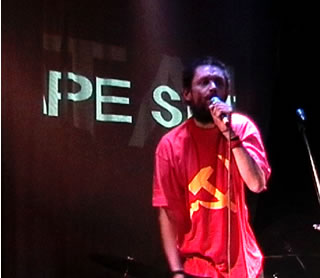
James MacDougall of Ape Shit
Mad Pride at the Bull & Gate 19 November 2002
As James MacDougall from the esteemed Mad Pride band puts it: "Too many cowboys, not enough Indians - go APE SHIT!!".
(1) Carole Ferrier is an Australian leftwing academic - and activist (she built an IS branch in Sydney in the 80s and 90s). She edits a socialist-feminist literary and political journal called Hecate and is responsible for renewed interest in Jean Devanney, who wrote racey novels and had a conflictual time with the very strait-laced Australian CP in the 30s and 40s. Ferrier knew Mike Dougan ("the Doug"), an ex-catholic from Pudsey I recruited to Leeds SWP and who emigrated to Australia in the early-80s - though he's no longer an IS member, he does health-and-safety inspections for one of the larger unions.
(2) For my deeply respectful, forelock-tugging, plonker-pulling review, see <www.metamute.com>.
More Critical Literalism